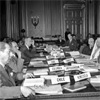“A LIVING THING IS BORN”
by René Wadlow
November 15, 1920 – The First Assembly of the League of Nations, Geneva
“A general association of nations must be formed under specific covenants for the purpose of affording mutual guarantees of political independence and territorial integrity to great and small States alike.” President Woodrow Wilson. The last of the fourteen points in which he set out in January 1918 the Allied war aims.
November 15 marks the anniversary of the first session of the Assembly of the League of Nations. Representatives of 44 States entered La Salle de la Réformation in central Geneva. The Salle had been built originally as a meeting place for Protestant refugees from France and Italy who needed a place of worship and a place for discussions and welfare. In the large hall, there was Léon Bourgeois, the oldest delegate and a long-time French worker for peace. Ignace Paderewski headed the Polish delegation in a room where he had given piano concerts. There was Lord Robert Cecil, who with Jan Christian Smuts of South Africa was a principle author of the League Covenant. There were delegates from South Africa and India which had “dominion status” but were not yet fully independent.
Significant were the countries not represented: the USA, the USSR, Germany, Austria and Hungary − all of whom had participated in parts of the First World War. Woodrow Wilson had welcomed the birth of the League of Nations: “A living thing is born.” Unfortunately, the League ran into difficulties from the start. The United States refused to join; too long a time elapsed before Germany was admitted or the USSR asked to join. The legacy of the First World War, codified in the Versailles Treaty, upset both the political and economic climate: huge reparations due by Germany, the payment of large debts by the Allies to the US, monetary collapse in several countries and economic protectionism rampant. All this contributed to the Great Depression of the 1930s.
The greatest trouble, however, was the mentality of the officials in national foreign ministries and war offices who were thinking in terms of the balance of power and who could not bring themselves to face new challenges. Nor was there among the general public a sense of global citizenship, of world loyalty which might have influenced government leaders in a more positive direction. Even today, as Brian Urquhart has said of the United Nations (UN), “There has yet to emerge, on the international scene, a great combined popular constituency to insist on the necessity of a respected central order and an orderly process of law and the keeping of peace.” However, there were real contributions of the League to the development of world institutions. The UN’s structure is that of the League − only the names have been changed: The League Assembly became the General Assembly, the League Council became the Security Council, the Mandates Commission became the Trusteeship Council.
A crucial contribution was the creation of an impartial civil service responsible only to the head of the organization under the obligation not to accept instructions from any government or outside authority. The League created a high quality staff under the direction of the first Secretary-General, Sir Eric Drummond, who served from the start until 1933.
The League also provided the starting point for future work on refugees, drug control, health and agriculture through its close cooperation with the International Institute of Agriculture set up in Rome. The International Labor Organization functioned alongside the League, its budget being voted by the League Assembly.
Looking back, we can mark the progress not only of the institutions but also the persons who shape them. A new breed of international civil servants are evolving within world organizations and non-governmental organizations active within the UN system to make this earth a true home for humanity. They have dedicated themselves to the same tasks that the League began but left unfinished.
Prof. René Wadlow is President of the Association of World Citizens.

